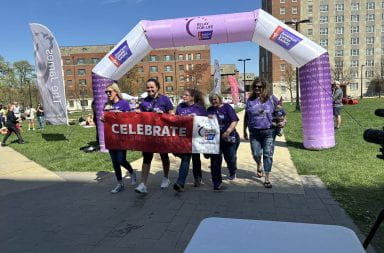
The BetMGM Sportsbook & Lounge at MGM Springfield. Credit: Hoang ‘Leon’ Nguyen | The Republican via TNS
With sports betting now legal in Ohio, college students are at an all-time risk of developing gambling-related addictions, according to critics, experts and doctors in gambling and treating addictions.
A state law, which took effect Jan. 1, made Ohio the 33rd state to legalize sports betting, cementing one of the biggest such gambling expansions in the entire nation. The law’s supporters said it will produce millions in new tax revenues for the state that will support education — and pay for addiction services.
Bruce Jones, a gambling intervention program administrative coordinator at Maryhaven Recovery Center, a Columbus-based addiction treatment center, said he thinks college students “are the most at-risk group” for gambling addictions. A key provision of the law, however, prohibits the advertisement of sports gambling services on college and university campuses.
Additionally, it is illegal for anyone under 21 to gamble, according to Ohio law.
Gov. Mike DeWine and the Ohio Casino Control Commission said in a Jan. 3 statement regarding sports gambling that violations will result in swift and steep penalties.
“The companies that are doing the massive advertising need to be aware that they’re being looked at very closely by the governor and the Casino Control Commission,” DeWine said.
Gambling within the college community
Despite these restrictions, Derek Longmeier, executive director of the Problem Gambling Network of Ohio — a group that seeks to help Ohioans with gambling addiction — predicts a large number of college students will fall prey to sports betting.
“The demographic for sports bettors tends to be different than other forms of gamblers,” Longmeier said. “They tend to be much more educated. They come from higher incomes, and they’re more likely to be in the 18-25 age range.”
According to the National Council on Problem Gambling, from 2004-18 participation in fantasy sports gambling quadrupled from 14 million to 57 million people. The Fantasy Sports & Gaming Association stated from its 2022 survey that 48 percent of players are between the ages of 18-34, and 45 percent are betters from the same age group.
Longmeier and Jones said part of the problem is just how available sports betting will become.
“The law was the largest sports betting expansion in the country because of the three different types of licensures,” Jones said.
Two of the gambling licenses allow mobile sports betting — usually done through apps like FanDuel and DraftKings — and through casinos and other brick and mortar businesses.
Jones said a third license allows “any company that has a liquor license and sells a lottery” to have a sports gambling “kiosk in their place of business.”
The Ohio Legislative Service Commission states sports gambling will produce “several tens of millions of dollars per year.” The gross earnings made from sports gambling will be taxed at 10 percent, with 98 percent of those funds going to educational services and the other 2 percent to gambling addiction services.
Ryan Ruddy, a senior lecturer in economics at Ohio State, noted a study from West Virginia University found the introduction of sports gambling resulted in a decrease in revenue from the lottery and other gaming types. Considering a large majority of sports betting is done through mobile applications, a lot of that lost revenue will go to the operators that reside outside of the state.
Gambling studies
Longmeier said a statewide campaign called “Pause Before You Play” allows people to look at what gambling is about and the choices those more experienced will make when engaging.
“The two main elements of the campaign are setting limits and limiting the amount of time and money spent,” Longmeier said. “The other is recognizing the risks.”
Longmeier said another program called “Timeout Ohio” allows players to exclude themselves from casinos, race and sports betting, and that it’s “up to that individual to decide” if he or she needs a break.
“That could be a year break, or it could be forever, and it is up for them to determine,” Longmeier said. “There is an element for the casino and racing or properties that if they come on property after they voluntarily excluded themselves, they could be charged with criminal trespass.”
While college students are at a heightened risk of sports gambling, the effects have broader statewide implications as well.
Dr. Trent Hall, an assistant professor of addiction medicine in the Department of Psychiatry and Behavioral Health at the Ohio State Wexner Medical Center, said gambling disorders are rare because of the U.S. restrictions on gambling and betting.
“We think that availability of gambling is actually the most important risk factor for developing this health condition,” Hall said. “The more available gambling is, the higher the risk.”
Hall said there are similarities between gambling addiction and drug and alcohol addiction. Types of learning associated with addictions, called operant conditioning, can provide rewards that can be exciting, which releases dopamine in the brain. This can fuel compulsive behavior, Hall said.
“[Operant conditioning] can get us taking riskier bets or beginning to gamble in a way that feels out of control,” Hall said.
A 2012 Ohio for Responsible Gambling survey found 5 percent of the Ohio population was at risk of developing a gambling disorder. This number doubled to 10 percent in 2017. Jones said he sees that number growing when the next round of survey results come out later this year due to increased sports gambling.
“I know [the number of those at risk for developing a gambling disorder] is going to increase quite a bit, but to what extent, I don’t know,” Jones said.
Traditional gambling can have its risks, but Hall said addiction professions believe sports betting is even more dangerous than going to a casino and gambling.
“It is available 24 hours a day,” Hall said. “This is on apps that are in our pockets and does dramatically increase the availability of gambling in Ohio.”
Hall said gambling can cause negative feelings as well. When a person is feeling anxious, sad, lonely or bored, they may find themselves gambling to relieve that negative feeling.
“That becomes a big problem because gambling itself can make us feel more anxious and depressed as we lose more money,” Hall said.
It is difficult to tell when someone is experiencing a gambling disorder. This only will get more difficult when it comes to the addition of sports betting apps on mobile devices, Hall said.
Hall also said there are signs indicating if a person is starting to develop a gambling disorder, including not paying bills or engaging or thinking a lot about gambling.
Further resources to aid gambling addictions
Jessica Franks, director of communications at the Ohio Casino Control Commission, said those dealing with gambling disorders have multiple options which can potentially help with their addiction.
“We have Ohio’s Problem Gambling Hotline at 1-800-589-9966, which folks can call for information on resources that might be available in your area if they feel that they need to talk to somebody,” Franks said. “We have the warm transfer program, whereby an individual will be transferred to a trained clinical professional that has experienced treating problem gambling, so they can get direct contact right away.”
Visit the Student Wellness Center’s website for more information and resources on struggling with gambling.


